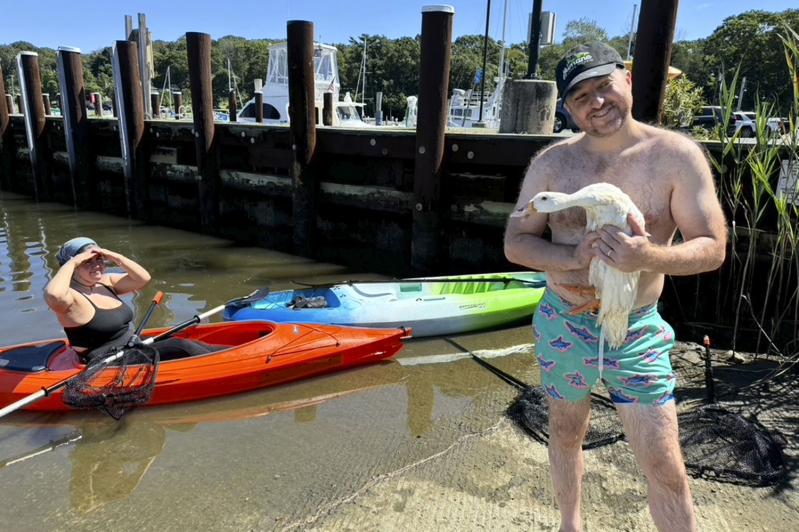On Aug. 12, two hinny ducks that were abandoned on Three Mile Harbor were rescued by John and Julia Di Leonardo of Humane Long Island. The ducks were discovered by Markie Hancock, a Springs filmmaker. She had been feeding them since June. One had suffered a torn bill, likely from a fishhook, and its tongue was stuck in the tear and dangling.
To capture them, the Di Leonardos kayaked into the harbor and corralled them back to land, where they were netted.
“All they can basically do is hide. They’re literally sitting ducks out there,” Mr. Di Leonardo said. “I’d be surprised if they had made it through the winter. Domestic ducks don’t have any natural instincts. They’re poor foragers, lack camouflage, and have tiny wings so they don’t fly well. They can’t get enough calories in the wild, yet they have a much higher need for calories.”
“People buy them from stores in the spring and then when they get big and messy, they no longer want them,” said Adrienne Gillespie, the hospital supervisor at the Evelyn Alexander Wildlife Refuge in Hampton Bays. “They find local ponds thinking they can survive, but they can’t for long.”
The opposite can happen as well, as at the so-called “duck pond” on the Nature Trail in East Hampton Village. There, an unhealthy concentration of wild birds — mallards and wood ducks — have come to rely on handouts and even a regular feeding schedule from members of the Ladies Village Improvement Society. The ducks are charming, yes, but they’re also wild animals.
“When domestics were being dumped there, they wouldn’t have survived without food, but there are no domestics there anymore,” Mr. Di Leonardo said. “A domestic duck is as different from a wild one as a house cat is to a tiger. Those ducks should be allowed to be wild.”
What’s a hinny duck? It’s a hybrid of two domestic ducks, a male common duck (“believed to have originated from the mallard,” according to the Cornell University College of Veterinary Medicine website) and a female muscovy duck. They’re a literal odd duck, because they’re sterile, and can’t be used for mating. They’ll lay an egg, but it won’t hatch. For that reason, they’re not raised commercially.
“I’ve rescued thousands of ducks, and I’ve only rescued one other hinny before,” Mr. Di Leonardo said.
“These ducks have been around for months,” Ms. Hancock said. “A lot of people in the boatyard knew about them and were feeding them. John had instructed us on what food to buy. One was dumped alone several months ago and then the second one appeared.”
Abandoned animals were once a bigger issue on the East End.
“That’s originally how ARF got its start,” according to Kimberly Nichols, the executive director of the Animal Rescue Fund of the Hamptons. “At the end of the season, there would be abandoned dogs, but we don’t see that anymore. Now we see people surrendering their animals for financial reasons. Maybe their dog has complicated issues, and veterinary care has become too expensive. Or they’ve become unhoused. Just this week alone, three people called who claimed to be living in their cars. Or people lose their lease, and they can’t take their dog or cat with them. We’ve seen a big number of those in the last month. They’re no longer abandoning their animals. That’s the important part. That’s why ARF is here, to help people.”
In a way, Humane Long Island has become an ARF, but for domestic birds. The group has a foster flock and works to rehome the birds, and claims on its website to have rescued hundreds of abandoned domestic ducks, roosters, and other fowl: “They suffer from frostbite, fungal and bacterial infections, and are riddled with parasites. This is not only tragic for the birds; it can also be disastrous for ecosystems.”
The day after the ducks were rescued, the hinny with the torn bill had surgery to put its tongue back in its mouth, and Mr. Di Leonardo reports that she is doing well. She was scheduled for another checkup this week, and eventually the duo will be put up for adoption. However, the adoption market for ducks isn’t what it is for the cats and dogs served by ARF. Moreover, ducks are flock animals. They don’t like to be single.
Nonetheless, Mr. Di Leonardo said a disturbing trend propagated by Instagram, with people using ducks as props, shopping with them or even running marathons with them, has taken hold.
“It’s a serious welfare issue for the birds. They’re raised as babies and imprint on those humans only because they’re not with any other duck. But humans need to go to work, and as flock animals, they’re terrified the moment their flock, or human, is gone. Purposefully imprinting a duck is a cruel thing.”
Further, people who think having ducks or chickens will save them money, because of the eggs, are living in a fantasy.
“You’re not saving any money when you have to pay vet bills or buy an enclosure,” he said. “You should only get ducks because you like ducks.”




